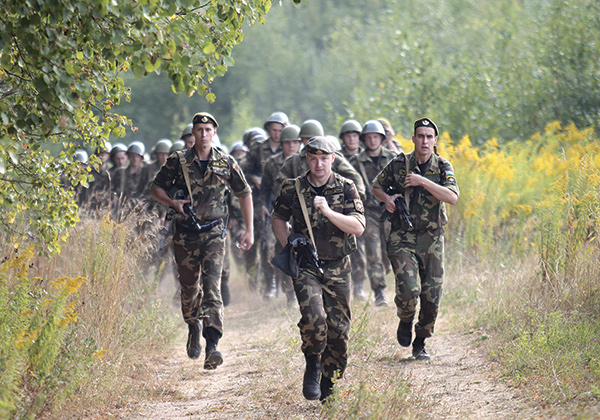
Armed Forces’ soldiers during tactical exercises
Mr. Lukashenko drew very convincing historical parallels, mentioning the global process of repartition of influence, which is transforming the face of international security. A similar situation developed at the end of the first half of the last century, leading to bloody world war.
As Hitlerite Germany lay prostrate, and the world surveyed a tragic number of victims, global power finally came into balance and, by mutual consent, the United Nations was created.
The President of Belarus notes that the world is again out-of-balance, saying, “It isn’t desirable to establish a new system of global security as a result of bloody slaughter. It would not resemble that of the mid 20th century, rather being a war of nuclear weaponry.”
For two decades, Belarus has warned of the danger of such dis-balance. Mr. Lukashenko met the military on being first elected president, even then criticising the application of international law, and NATO’s expansion eastwards in particular. His position was firm and has never changed. Over the past 20 years, the situation has become ever more tense. Existing geopolitical realities exert direct influence over Belarus, such that we must take this into account in building our national security systems, paying attention to negative trends.
In Ukraine, our neighbours fight for power over business, while criminality and the uncontrollable distribution of weaponry increase. There have been attempts to bring this situation into Belarus. Meanwhile there are attempts to reorient Ukraine towards the West. Mr. Lukashenko warns that Belarus is in danger of being surrounded by foreign military contingents. The situation is complicated by Kiev’s confrontation with Moscow, supported from outside. In this situation, it is vital to retain a political-diplomatic balance of relations with both states. “We should not be involved in their opposition,” Alexander Lukashenko has stated.
Belarus is doing all it can to subdue tension in the region, as has been appreciated by the world community. However, the fact remains that, for the first time in our post-Soviet territory, there is conflict and its development directly influences the security of Belarus. Mr. Lukashenko views this threat as being engineered by the USA and its allies, to secure their leading role in the modern world order. Accordingly, the President is convinced that it’s within this context that the escalating militarisation in the region should be viewed.
Relations between Russia and the West are strained, such as are impossible to ignore. In strengthening migratory streams, there is an obvious threat of international terrorism spreading across the Eastern European region.
Meanwhile, sanctions do nothing to aid stability. The opposition of Russia with the West is impacting on Belarus’ open economy and its transit aspirations.
The information field requires attention, since threats are regularly discussed at international level, relying on dialogue with partners. Belarus last entered into such discussion at the recent OSCE summit, in Dushanbe, where it became obvious that security is only possible when we pull together. Each country must undertake its own measures, as Belarus agrees, working with great thought and purpose. In this way, we may be able to preserve peace, consent and stability. Belarus may be the only post-Soviet country to have avoided internal power conflict, thanks to our Armed Forces.
According to the President, the army is solving the tasks it has been set but its work will continue, since threats will, undoubtedly, continue. Risk factors should be considered in planning the development of the Armed Forces for the coming five-year period.
Necessary decisions have been made at state level, so that agencies must now only follow the tasks set before them. The Commander-in-Chief is awaiting feedback and reports from various agency heads, including ministers, to inform the army’s future technical modernisation, the implementation of standards, and regulations for units and military camps. Such information will be used to optimise the operations of administrative personnel, to ensure peak physical fitness of the military and to undertake necessary training, including ideological work. The main points will be announced in the new plan of action for the military, being drafted at present, and which Mr. Lukashenko has asked to be ready by the end of the year, for his examination.
“Our main task is to provide social and political stability countrywide, rather than allowing chaos and destabilisation to reign,” the President has announced.
WORD FOR WORD
Speaking to the military, Alexander Lukashenko touched upon the notion of a hypothetical Russian air base in Belarus:
From a military point of view, neither we nor Russia need such a site. In peacetime, we have air defence forces on duty and these units include a Russian contingent. We aren’t trying to hide the fact that if Belarus faces military aggression, which is the same as aggression against Russia, joint regional military forces will be brought to bear.
In addition to our Armed Forces, those of the Russian army would be deployed to Belarus in accordance with our plan, which is no secret, including a large number of Russian aircraft. Media speculation is of a purely political character. If we open a Russian base on Belarusian territory, Belarus as well as Russia, would gain more disadvantages than advantages. As Head of State, I see no sense in being involved in power games with our western and eastern neighbours.
By Denis Krymov











